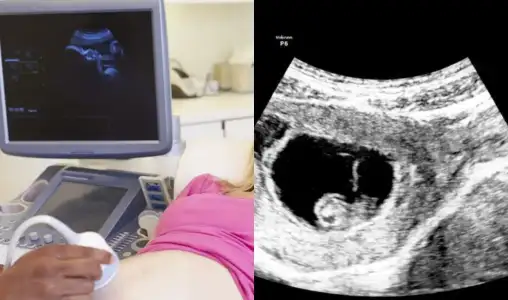When Does the Baby’s Heart Develop, When Can You Hear the Heartbeat?

If you are wondering at how many weeks the baby starts to beat in the womb, when does the heart develop in the fetus, can the heartbeat of the 7-week-old baby be heard and more, keep reading.
Fetal heart development continues throughout pregnancy and even shortly thereafter. At 5 weeks, the embryo forms two heart tubes that fuse. Blood flows through this tubular “heart” and cardiac activity begins. Sections of this tube will go on to form all the structures of the future heart. There are things you can do to protect your baby’s developing heart, such as avoiding cigarette smoke, alcohol, and certain medications.
When does your baby develop a heartbeat?
A baby’s heartbeat begins 4 weeks after conception or 6 weeks after the first day of the last menstrual period.
When you find out you’re pregnant, seeing your baby’s heartbeat can be one of the first milestones you expect. You don’t have to wait long. A baby’s developing heart begins to work rapidly because it is needed to deliver oxygenated blood and nutrients to other developing organs.
But at 6 weeks pregnant, the heart is not fully developed. For this reason, the cells in the embryonic heart tube are described as “heart activity” rather than a heartbeat.
When can you see your baby’s heartbeat?
About 4 weeks after conception or 6 weeks after your last menstrual period, the rapid pulsation of the embryo’s developing heart tube can be seen on ultrasound.
If you have a first trimester ultrasound (perhaps because you had a pregnancy complication before), it’s possible to see cardiac activity this early. This ultrasound can also be used to screen for heart problems; this can be important if there is a family history of congenital heart problems.
On your first ultrasound, it may be too soon to see heart movement if your doctor can’t see future heartbeats. (This is common!) If there is a “fetal pole” (visible embryo) and no heart movement, you may have a miscarriage. Your obstetrician or midwife will talk to you about what your individual ultrasound means and what your next steps are.
When can you hear your baby’s heartbeat?
If you don’t have an early ultrasound, you’ll likely hear your baby’s heartbeat at a prenatal visit between 10 and 16 weeks. Your doctor will use a fetal Doppler, a small handheld device that is pressed against your abdomen with some gel. Sometimes the position of your uterus, your baby, and the shape of your belly can make it difficult to find your heartbeat.
If you’ve been waiting to hear the familiar steady “lub-dub” sound of an adult heartbeat, you’re in for a surprise. Many women describe the sound of their baby’s heartbeat as similar to galloping horses. This is because your baby’s heart beats much faster than yours, averaging between 110 and 160 beats per minute. (A normal resting heart rate for adults is 60 to 100 beats per minute.)
At about 20 weeks pregnant, your baby’s heartbeat can be heard with a stethoscope.
How can you support your baby’s heart before and during pregnancy?
It’s important to do everything you can to stay healthy before and during pregnancy. But that’s no guarantee that nothing will go wrong. Some things – like some congenital heart defects – are largely out of your control. Some congenital heart defects may be related to a maternal illness, such as diabetes. In other cases, heart problems can run in families.
Some special things you can do:
- Avoid smoking and passive smoking.A number of studies have shown a strong link between cigarette smoke and congenital heart (and other) defects.
- Be wary of drugs. If you are on regular medication, talk to your healthcare provider before trying to conceive. Certain medications such as ACE inhibitors, the acne medication isotretinoin, lithium (a psychiatric medication), and warfarin (an anticoagulant) increase the risk of heart defects. You and your doctor can decide together that controlling your underlying health problems with this particular medicine is worth the small risk of fetal heart defect. However, there are often safer alternatives, so explore options with your doctor.
- Manage any chronic health condition. For example, if you had diabetes before you became pregnant, take steps to control your blood sugar before and during pregnancy. Pre-pregnancy out-of-control diabetes is one of the leading causes of congenital heart defects.
- Do not drink alcohol. Studies have shown that exposure to alcohol during pregnancy is significantly associated with heart defects. There is no known safe amount of alcohol during pregnancy.
- If necessary, get your rubella vaccine before you become pregnant. When you see your doctor for a pre-pregnancy visit, they can check to see if you’re still immune from your childhood MMR vaccine. Sometimes, immunity is reduced and women benefit from a pre-pregnancy MMR booster. (You should not get vaccinated during pregnancy.) Getting rubella during pregnancy can affect your baby’s heart development.
- Let your doctor know if you have a family history of congenital heart problems.They may order special ultrasounds to monitor the development of your baby’s heart.
- On-Site Comments
















Comment